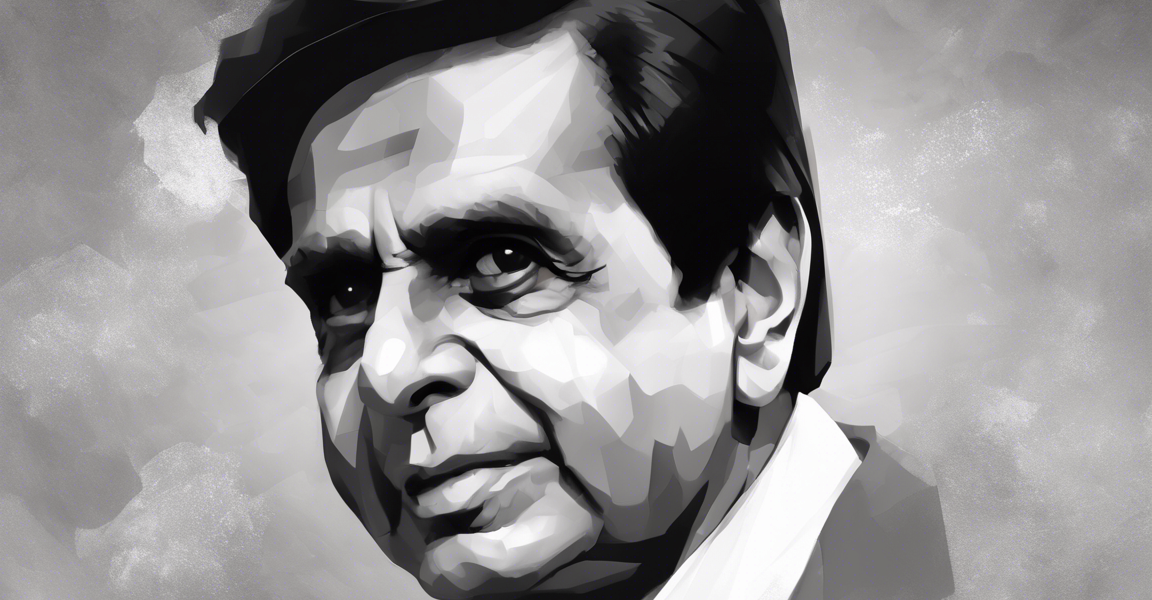Introduction
Dilip Kumar, born as Mohammad Yusuf Khan on December 11, 1922, was an Indian film actor, producer, and philanthropist who is regarded as one of the greatest actors in the history of Indian cinema. Known as the “Tragedy King” for his depiction of melancholic roles, Kumar’s career spanned over six decades and he starred in some of the most iconic films in Bollywood. His impact on Indian cinema is profound and his legacy continues to inspire actors and filmmakers to this day.
Early Life and Career Beginnings
Born in Peshawar, British India (now in Pakistan), Dilip Kumar moved to Mumbai in the 1940s to pursue a career in acting. He made his debut in Jwar Bhata (1944) but shot to fame with his performance in Jugnu (1947). It was his role in the film Shaheed (1948) that earned him critical acclaim and established him as a promising actor in the industry.
The Rise to Stardom
Dilip Kumar’s acting prowess and intensity set him apart from his contemporaries. He delivered memorable performances in films like Andaz (1949), Deedar (1951), and Daag (1952), showcasing his versatility as an actor. However, it was his collaboration with director Mehboob Khan in Aan (1952) and Mother India (1957) that catapulted him to superstardom.
The Peak of Success
In the 1950s and 1960s, Dilip Kumar ruled the Indian film industry with a string of successful films. His performances in classics like Devdas (1955), Naya Daur (1957), Mughal-e-Azam (1960), and Ganga Jamuna (1961) solidified his reputation as a cinematic legend. His ability to portray a wide range of emotions with depth and authenticity endeared him to audiences across the country.
Legacy and Impact
Dilip Kumar’s influence on Indian cinema is immeasurable. He redefined acting in Hindi films with his naturalistic approach and nuanced performances. His on-screen presence was magnetic, and he had a unique ability to evoke empathy from viewers. Kumar’s collaborations with leading actresses like Vyjayanthimala, Madhubala, and Meena Kumari resulted in iconic on-screen pairings that are still cherished by fans.
Later Career and Contributions
In the latter part of his career, Dilip Kumar continued to take on challenging roles that showcased his range as an actor. Films like Shakti (1982), Karma (1986), and Saudagar (1991) demonstrated his enduring appeal and talent. Kumar also ventured into production with films like Gunga Jumna (1961) and Dastaan (1972), further solidifying his status as a multifaceted artist.
Awards and Recognitions
Dilip Kumar’s contributions to Indian cinema have been widely celebrated. He is the recipient of numerous accolades, including eight Filmfare Awards for Best Actor, the Padma Bhushan in 1991, and the Dadasaheb Phalke Award in 1994. His impact on the film industry transcends generations, and he remains a revered figure in Indian popular culture.
Personal Life and Philanthropy
Outside of his acting career, Dilip Kumar was known for his humanitarian efforts and philanthropy. He was actively involved in various charitable causes and worked towards the betterment of society. His marriage to actress Saira Banu in 1966 was a union that stood the test of time, showcasing a rare love story in the world of showbiz.
Conclusion
Dilip Kumar’s legacy as an actor, humanitarian, and cultural icon continues to inspire admirers of Indian cinema. His body of work remains a testament to his dedication to the craft and his ability to leave a lasting impact on audiences. As fans reflect on his remarkable career, it is evident that Dilip Kumar’s contributions to the world of entertainment are timeless and invaluable.
Frequently Asked Questions (FAQs)
- What was Dilip Kumar’s real name and when was he born?
Dilip Kumar’s real name was Mohammad Yusuf Khan, and he was born on December 11, 1922.
- Which film catapulted Dilip Kumar to stardom in the Indian film industry?
Dilip Kumar achieved stardom with his role in the film Shaheed (1948), which garnered critical acclaim.
- What earned Dilip Kumar the title of the “Tragedy King” in Bollywood?
Dilip Kumar’s portrayal of melancholic roles with depth and intensity earned him the title of the “Tragedy King” in Bollywood.
- How many Filmfare Awards did Dilip Kumar win for Best Actor?
Dilip Kumar won eight Filmfare Awards for Best Actor during his illustrious career.
- Which iconic films did Dilip Kumar star in during the peak of his success in the 1950s and 1960s?
Dilip Kumar starred in classics like Devdas (1955), Mughal-e-Azam (1960), and Ganga Jamuna (1961) during the peak of his success.
- What was Dilip Kumar’s contribution to Indian cinema outside of acting?
Besides acting, Dilip Kumar ventured into film production and was involved in various charitable causes, showcasing his multifaceted talent and philanthropic nature.
- When did Dilip Kumar receive the Padma Bhushan and the Dadasaheb Phalke Award?
Dilip Kumar received the Padma Bhushan in 1991 and the Dadasaheb Phalke Award in 1994 for his outstanding contribution to Indian cinema.
- Who was Dilip Kumar married to, and when did they tie the knot?
Dilip Kumar was married to actress Saira Banu, and they got married in 1966, forming a celebrated union in the world of Bollywood.
- What aspect of Dilip Kumar’s acting style set him apart from his contemporaries?
Dilip Kumar’s naturalistic approach and ability to portray a wide range of emotions with authenticity set him apart from his contemporaries in Indian cinema.
- How did Dilip Kumar leave a lasting impact on the world of entertainment?
Dilip Kumar’s legacy as an actor, humanitarian, and cultural icon continues to inspire audiences, showcasing his timeless contributions to the world of entertainment.




